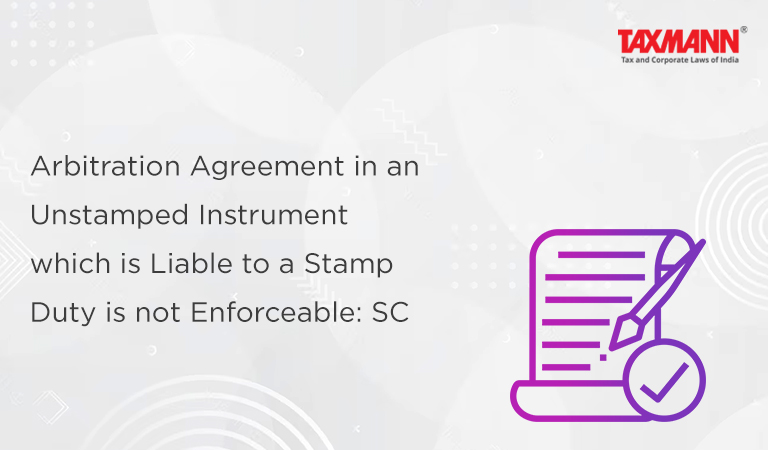Arbitration Agreement in an Unstamped Instrument which is Liable to a Stamp Duty is not Enforceable: SC
- Blog|News|Company Law|
- 2 Min Read
- By Taxmann
- |
- Last Updated on 28 April, 2023

Case Details: N. N. Global Mercantile (P.) Ltd. v. Indo Unique Flame Ltd. - [2023] 149 taxmann.com 435 (SC)
Judiciary and Counsel Details
-
- K.M. Joseph & C.T. Ravi Kumar, JJ.
Facts of the Case
In the instant case, the petitioner and respondent had entered into a sub-contract which contained an arbitration clause. Certain disputes arose and the respondent invoked the Bank Guarantee furnished by the petitioner. A suit was filed regarding the invocation of the guarantee.
Consequently, the respondent filed an application u/s 8 of the Arbitration and Conciliation Act 1996 in the suit and sought for reference of disputes to arbitration. However, the Commercial Court rejected the application.
Thereafter, a revision application was filed by the respondent before the Bombay High Court. The High Court granted liberty to the respondent to withdraw the review and file a writ petition. Subsequently, in the writ petition, the High Court held that Section 8 application was maintainable.
However, one of the issues before the High Court was that the arbitration agreement was unenforceable since the sub-contract was unregistered and unstamped. It noted that the said issue can be raised in an application u/s 11 or before the Arbitral Tribunal.
Consequently, the Apex Court was presented with the question of whether an arbitration clause in a contract, which is legally required to be both registered and stamped, can still be considered valid and enforceable if it has not been properly registered and stamped.
Supreme Court Held
The Supreme Court observed that an arbitration agreement as defined by Section 7 of the Arbitration and Conciliation Act is subject to stamp duty, and if it is not stamped adequately, it cannot be enforced as per Section 35 of the Stamp Act without being impounded and paying the necessary duty.
The Supreme Court, further observed that the provisions of Section 33 and the bar u/s 35 of the Stamp Act would render the arbitration agreement invalid until the instrument is duly stamped and validated under the Stamp Act.
The Supreme Court also observed that a certified copy can be produced at the Section 11 stage only if it clearly indicates the stamp duty paid. If the same is not mentioned, the Court should not act on the said certified copy.
The Supreme Court held that an Arbitration Agreement, within the meaning of Section 7 of the Arbitration and Conciliation Act 1996 attracts stamp duty and which is not stamped or insufficiently stamped, cannot be acted upon, in view of Section 35 of the Stamp Act, unless following impounding and payment of the requisite duty.
The Supreme Court concluded that the provisions of section 33 and the bar u/s 35 of the Indian Stamp Act would render the arbitration agreement contained in such instrument as being non-existent in law until the instrument is validated under the Stamp Act.
Disclaimer: The content/information published on the website is only for general information of the user and shall not be construed as legal advice. While the Taxmann has exercised reasonable efforts to ensure the veracity of information/content published, Taxmann shall be under no liability in any manner whatsoever for incorrect information, if any.

Taxmann Publications has a dedicated in-house Research & Editorial Team. This team consists of a team of Chartered Accountants, Company Secretaries, and Lawyers. This team works under the guidance and supervision of editor-in-chief Mr Rakesh Bhargava.
The Research and Editorial Team is responsible for developing reliable and accurate content for the readers. The team follows the six-sigma approach to achieve the benchmark of zero error in its publications and research platforms. The team ensures that the following publication guidelines are thoroughly followed while developing the content:
- The statutory material is obtained only from the authorized and reliable sources
- All the latest developments in the judicial and legislative fields are covered
- Prepare the analytical write-ups on current, controversial, and important issues to help the readers to understand the concept and its implications
- Every content published by Taxmann is complete, accurate and lucid
- All evidence-based statements are supported with proper reference to Section, Circular No., Notification No. or citations
- The golden rules of grammar, style and consistency are thoroughly followed
- Font and size that’s easy to read and remain consistent across all imprint and digital publications are applied



 CA | CS | CMA
CA | CS | CMA
